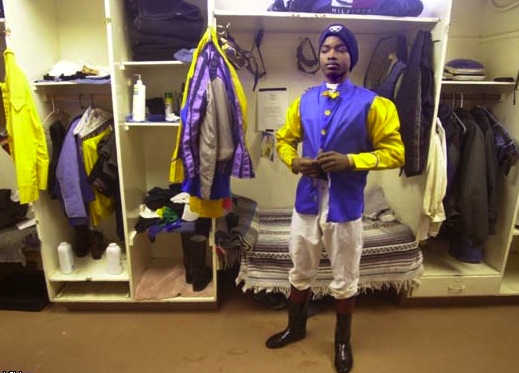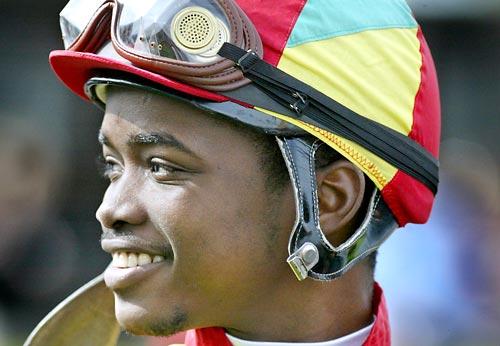When the most wonderful time of the year rolls around next month (Kentucky Derby), we will witness something unusual: an actual BLACK JOCKEY. Kevin Krigger is a handsome, soft-spoken 27 year old from St. Croix, U.S. Virgin Islands who left his home at 17 to pursue his lifelong dream of being a jockey. Based in Northern California in 2011, Krigger won 165 races; his mounts earned $2.8 million. In 2012 based in Southern California, Krigger won just 73 races, but his mounts earned more than $3.6 million, including $600,000 in the Delta Downs Jackpot and $750,000 in the Santa Anita Derby today.
In the first Kentucky Derby in 1875, 13 out of 15 jockeys were black. Among the first 28 derby winners, 15 were black. African American jockeys excelled in the sport in the late 1800s. But by 1921, they had disappeared from the Kentucky track and would not return until Marlon St. Julien rode in the Derby in 2000.
African American jockeys’ dominance in the world of racing is a history nearly forgotten today. Their participation dates back to colonial times, when the British brought their love of horseracing to the New World. Slaveowners Founding Fathers George Washington and Thomas Jefferson frequented the track, and when President Andrew Jackson moved into the White House in 1829, he brought along his prized Thoroughbreds and his own personal black jockeys.
Horse racing was tremendously popular in the South, so it’s not surprising that the first black jockeys were slaves. Slaves grew up on farms, worked in stables, groomed and trained the horses. When racing became organized sport in the early 19th century, these guys dominated the sport. Racing provided slaves a false sense of freedom. They were allowed to travel the racing circuit, competing alongside whites, and when black jockeys were cheered to the finish line, the only colors that mattered were the colors of their silks. Horseracing was one of the few ways for slaves to achieve status.
The Civil War devastated racing in the South, and emancipated African American jockeys followed the money to tracks in New York, New Jersey and Pennsylvania. By the time freedom came they were still rooted in the sport and soon dominated the newly organized Kentucky Derby. On opening day, May 17, 1875, Oliver Lewis, a 19-year-old black Kentuckian, rode a chestnut colt named Aristides – trained by a former slave – to a record-setting victory. Two years later a black 17-year old named William Walker, won the crown.
Isaac Murphy won the Kentucky Derby in 1884, 1890, and 1891, becoming the first jockey to win three Kentucky Derbys. Murphy won a mind-boggling 44 percent of all the races he rode, a record still unmatched. Isaac Murphy was the first black jockey to be inducted to the National Museum of Racing and Hall of Fame in Saratoga Spring – in 1955.
In 1892, 15 year old Alonzo “Lonnie” Clayton, became the youngest to win the Kentucky Derby. James “Soup” Perkins, began racing at age 11 and claimed the 1895 Derby. Willie Simms won in 1896 and 1898. Jimmy “Wink” Winkfield won the Kentucky Derby in 1901 and 1902 and would be the last African American to win the race. Wink won more than 160 races in 1901, yet Goodwin’s Annual Official Guide to the Turf omitted his name. In 1911 Jess Conley came in third in the derby and in 1921, Henry King placed tenth. Seventy-nine years would pass before another African American would ride in the Kentucky Derby (Marlon St. Julien rode in 2000 and Patrick Husbands rode in 2006.).
The rising scourge of segregation had seeped into horse racing. The white hoipoloi didn’t fancy sharing their mint juleps with African Americans, although blacks continued to work as groomers and trainers. Intensified competition for mounts, the northern migration of blacks from southern farming communities, the economic recessions of the period that shuttered racetracks and diminished attendance, and plain old racism, shrunk the demand for black jockeys. White Jockeys formed a union (with the approval of white owners, etc) that denied membership to Black Jockeys, calling the official end of Black Jockeys at the Kentucky Derby.

Cometh Kevin Krigger – gorgeous, with a lilting Virgin Islands accent, easy going and affable, outwardly mellow, while fiercely competitive. He is going to be a huge star. Bet on it.
